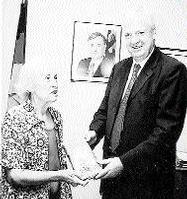
Mrs. Leeta Hearne, widow of Jamaican novelist, John Hearne, presents a copy of the German version of Mr. Hearne's last novel, 'The Sure Salvation' to the German Ambassador to Jamaica, Volker Schlegel, at the German Embassy in Kingston. Among those witnessing the occasion were Dr. Ralph Thompson, poet, businessman and writer on educational matters, and his wife Doreen, Kim Robinson Walcott, Sir Arthur Lewis Institute of Social & Economic Studies, UWI, Carolyn Allen, director of the Philip Sherlock Centre for the Creative Arts, UWI, and Norman Rae, family friend. - contributed
The Caribbean novel developed rapidly on a professional basis after World War II ended. Previously, there had been the odd publication, romantic 'historical' pieces, spicy love stories, but suddenly, when things were returning to normal in Britain, which along with the United States of America, was the centre of the book-publishing world where authors writing in English were concerned - a group of West Indians appeared, found publishers for their work and within a few years there was a body of published material which could truly be described as West Indian Literature.
Among the pioneers were writers like Roger Mais and John Hearne (Jamaica), Edgar Mittelholzer and Wilson Harris (Guyana), Samuel Selvon and C.L.R. James (Trinidad), George Lamming (Barbados). They all had had the experience of living in Britain and had grown up under the educational and political systems of the then colonies.
Their struggle for recognition paved the way for the next generation of West Indian novelists, poets and playwrights like Derek Walcott, V.S. Naipaul, Andrew Salkey, Trevor Rhone, Olive Senior, Eddie Baugh, Mervyn Morris, Rachel Manley, and many others.
John Hearne was very much in the forefront of the pioneers. He attracted the eye of the prestigious publishers Faber and Faber (one of whose directors had been T.S. Eliot, perhaps the most celebrated poet of the first half of the 20th century). They published his first novel Voices Under The Window in 1955 and that was the beginning of a series of six: Stranger At The Gate, The Faces of Love, The Autumn Equinox, Land Of The Living, The Sure Salvation published under his own name and three, Fever Grass, The Candywine Development, The Checkerboard Caper, in collaboration with the well-known local columnist Morris Cargill under the name John Morris, in which they created Jassy Vane, a female counterpart of James Bond, as the heroine in adventure stories set in Jamaica.
Hearne's novels were translated and published in several languages, and although the spotlight has been off him for a while in favour of focus on Walcott and Naipaul, as often happens, the wheel seems about to turn once more in his direction. Calabash, the St. Elizabeth literary festival, recently republished Voices Under The Window. Derek Walcott, Nobel Prize-winner, at the recently held writers' conference at UWI, made flattering references to Hearne's work in his feature address, suggesting that more careful attention should be paid to his oeuvre. Now, the last book, The Sure Salvation, has been issued by Reihe Duran, German publishers, in their Edition 8 series, in a new German translation under the title Das Paradies Vor Augen (The Paradise Ahead).
When The Sure Salvation first appeared in 1981, the Times Literary Supplement called it "an absorbing novel. The old power of the sea story to provide pleasure and instruction seems to be as potent as ever ..."
Becalmed on an empty sea, the crew of The Sure Salvation can only wait. Their cargo, being perishable, can only perish. John Hearne's novel grips with hypnotic power from the first page. And the resolution of its deadlocked opening, the revelation of what is battened down in the ship's hold, creates a narrative climax compounded equally of pity and terror.
The Financial Times reviewer had this to say: "It is strong stuff, heady and persuasive ... able to conjure a totally unfamiliar ambience and to suggest, without overt moralising, the moral issues of a situation that now seems unfaceably evil ..."

